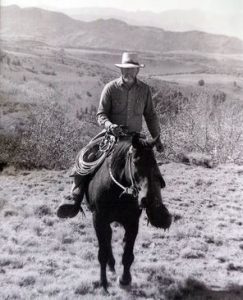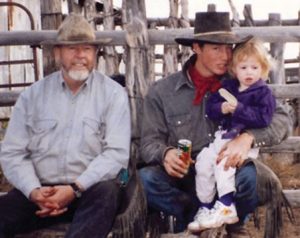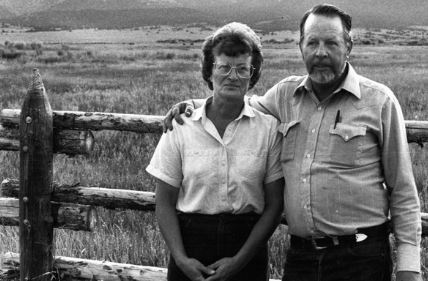 According to the Capital Press, the Ninth Circuit Court of Appeals has reversed a ruling that held the government conspired against rancher Wayne Hage, who was an icon of the “Sagebrush Rebellion” against public land management.
According to the Capital Press, the Ninth Circuit Court of Appeals has reversed a ruling that held the government conspired against rancher Wayne Hage, who was an icon of the “Sagebrush Rebellion” against public land management.
In 2013, a federal judge ruled that the U.S. Forest Service and Bureau of Land Management deprived rancher Wayne Hage, who died in 2006, of his due process rights and water rights.
Hage’s battle with the federal government is often seen as symbolic of the broader “Sagebrush Rebellion” among ranchers against federal land management.
Significantly for other Western ranchers, the 9th Circuit has now ruled that cattle can’t incidentally graze on public lands when accessing a rancher’s private water right on federal property.
This holding creates confusion among ranchers who also own water rights on public land, as the 9th Circuit reached the opposite conclusion from the U.S. Court of Federal Claims, said Brian Hodges, an attorney with the Pacific Legal Foundation, a nonprofit law firm that specializes in property rights and has tracked the Hage litigation.
“You’re told by one court that you can do it, but by another one that you can’t,” Hodges said.
The 9th Circuit’s finding reinforces the federal government’s control over its property, said Hillary Hoffmann, an environmental law professor at Vermont Law School who filed a brief the case on behalf of the Natural Resources Defense Council.
If ranchers want to access their water rights, they must get permission from federal agencies to build pipelines or bring livestock onto the land, she said. “The federal government holds the cards as far as allowing access.”
Hage and his estate have seen major victories and defeats in their legal fights with the government, which have spanned more than two decades.
In the Nevada case recently reviewed by the 9th Circuit, U.S. District Judge Robert Jones said government officials entered into a “literal, intentional conspiracy” against Hage that “shocks the conscience” and justifies an injunction prohibiting the agencies from continuing the behavior.
That ruling sprang from a lawsuit that the federal government brought against Hage’s estate, accusing his ranch of trespassing by allowing its cattle to graze on public land.
 The case backfired against the government when the judge agreed with Hage’s counterclaims, which alleged that the agencies unlawfully refused to renew his grazing permits.
The case backfired against the government when the judge agreed with Hage’s counterclaims, which alleged that the agencies unlawfully refused to renew his grazing permits.
While there’s no right to graze on federal land, the judge held that the government violated administrative law when it refused to renew his grazing permits for reasons unrelated to proper rangeland usage.
Jones found that the government “vindictively” withheld the permits because Hage made a note on a grazing contract refusing to waive his rights, which would not have affected the substance of the agreement.
Due to this note, the government took the “nonsensical position” that the permit application hadn’t been properly completed, and stopped allowing Hage to graze his cattle beginning in 1993, the judge said.
The government also tried to transfer water rights owned by Hage and encouraged another rancher to apply for grazing permits on allotments traditionally used by Hage, Jones said.
The agencies retaliated against people who sold cattle to Hage to pressure them to cease doing business with him or to prevent them from testifying in the lawsuit, he said.
Jones ruled that Hage held water rights in streams on public land, which offered a valid defense against most of the government’s accusations of trespassing.
It’s reasonable for cows to incidentally graze within a half-mile of Hage’s water rights as they cross federal land, the judge said.
“It is not fair to say that cattle must be taken to the shore of a stream, kept there and watched constantly until they drink, and then taken off of the land,” Jones said. “The testimony at trial was uncontroverted that cattle cannot be made to drink on command in this way.”
The judge issued an injunction that barred the government from interfering with Hage’s access to water rights and ordered the agencies to renew his grazing permits, among other provisions.
That ruling has now been reversed by the 9th Circuit, which held that Jones ignored longstanding legal precedent in his opinion.
Ownership of water rights does not give a rancher the right to graze livestock on federal property, though he can divert water from a stream on such land, the appeals court held.
As for the due process rights related to Hage’s grazing permits, the 9th Circuit held that the statute of limitations on such claims had run out.
The appellate court rejected the judge’s finding that the statute of limitations hadn’t expired because the government’s refusal to permit grazing was a continuing violation of his rights.
The 9th Circuit sent the case back for reconsideration by a different federal judge due to Jones’ “bias,” “prejudgment” and “animus toward the federal agencies.”
Mark Pollot, the attorney for Hage’s estate, said he plans to challenge the 9th Circuit’s ruling, either by asking for reconsideration by a larger panel of appellate judges or by requesting a review from the U.S. Supreme Court.
The possibility of the Supreme Court weighing in on the case is likely because the 9th Circuit’s ruling is contrary to other legal precedents that prohibit interference with water rights, he said. “It really does undermine the basis of Western water law.”
The three-judge panel that ruled against Hage also misinterpreted a legal precedent related to grazing and water rights, he said.
Water rights don’t allow for unlimited grazing on government land, but they do allow incidental usage of rangeland by livestock as it travels to a water source, Pollot said. “That’s not a generalized grazing right.”
You may also like
-
Arizona rancher sues to stop million-acre national monument
-
VDH: How to Destroy the American Legal System
-
Colorado conservation group sues wildlife officials for skirting NEPA to get wolves into the state
-
Polis adds another radical activist to Colorado Parks & Wildlife Commission
-
Public Land Expansion Syndrome in the West

